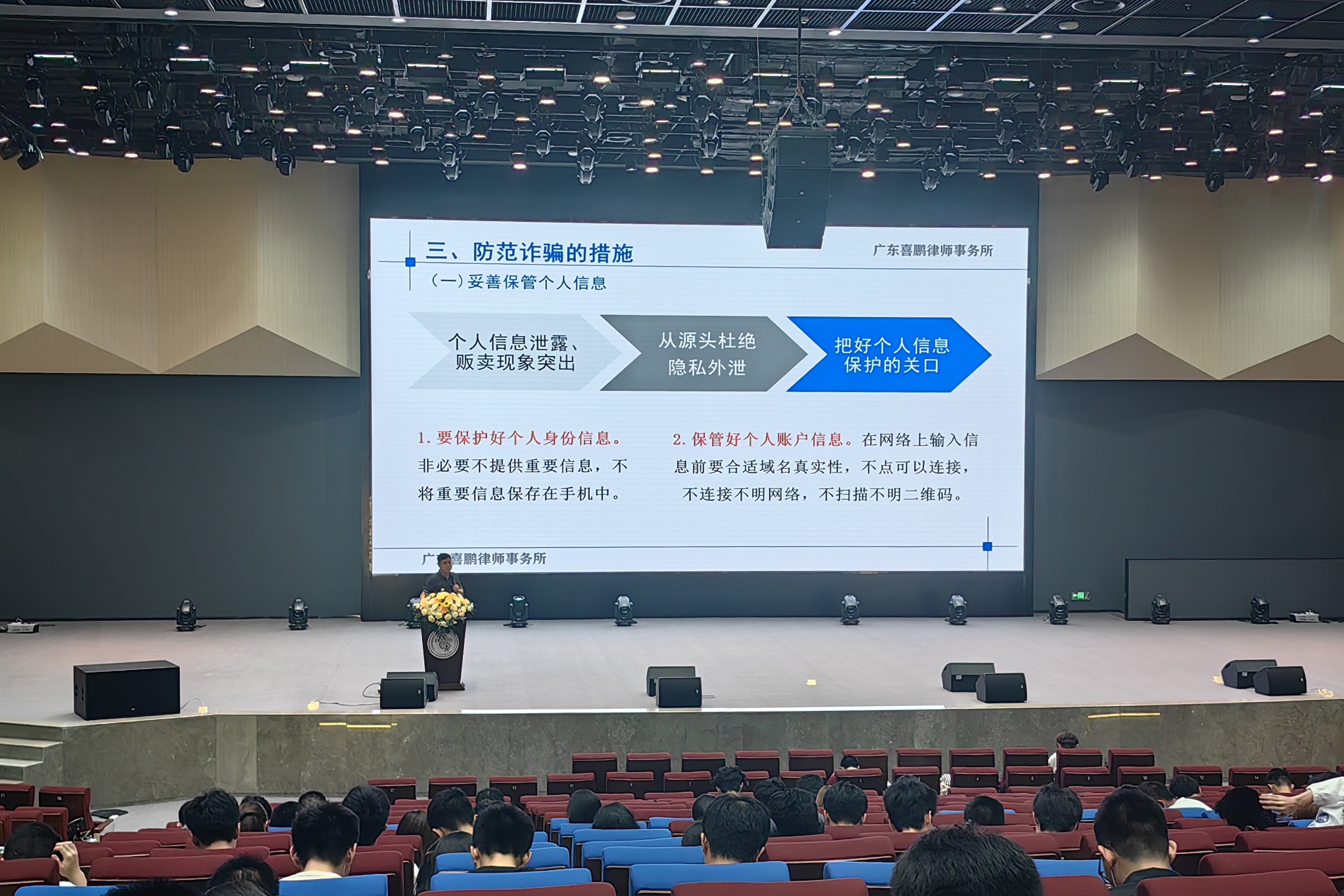PostTime:9/27/2024
Upon the arrival of the 2024 Cohort students, Guangdong Technion - Israel Institute of Technology (GTIIT) held three legal science popularization lectures, focusing on the highlights of the Civil Code, identifying the crime of "Providing Aid for Criminal Activities in Relation to Information Network" and preventing online fraud. These lectures aimed to enhance students' legal awareness, establishing a sense of the rule of law with a feast of legal knowledge.
Highlights of the "Marriage and Family" Book of the Civil Code
In the first legal lecture, Ms. Lin Sidan from Guangdong Jiage Law Firm introduced the key legal points related to marriage and inheritance in the Civil Code.

"Housewives are no longer unpaid nannies", "The cooling-off period for divorce can last up to 60 days", "Wills can now be printed, recorded, and filmed", "Failure to truthfully disclose serious illnesses before marriage can lead to the annulment of the marriage" ... Combining current hot topics and real-life cases, the lecture guided the students to understand the specific meanings and applicable scopes of the relevant regulations in the Civil Code. The one-hour lecture was packed with knowledge, allowing students to gain a deeper understanding of the practical application and effects of the Civil Code.
Ms. Lin pointed out that marriage and family are not only related to personal emotional disputes, but also involve law, morality, privacy protection, public opinion, etc. Everyone should abide by the law and protect their rights rationally.
Learn about the crime of "Providing Aid for Criminal Activities in Relation to Information Network"
"Hey, would you like to do a part-time job? You can make money just by helping with money transfers." Some university students may choose to take on part-time jobs to earn compensation. Some part-time jobs may sound simple and lucrative, highly tempting, but they could potentially involve cybercrimes.
In the second legal lecture, Dr. Xia Ruihong from the School of Law at Shantou University gave a lecture with the theme of "Identification and Prevention of 'Providing Aid for Criminal Activities in Relation to Information Network'" to explain the crime, which was newly established in the 2015 Criminal Law Amendment (IX).

Providing Aid for Criminal Activities in Relation to Information Network, refers to the criminal act of knowingly assisting others in carrying out crimes using information networks. In light of the recent high incidence of telecom fraud, this crime serves as an accomplice to information network crimes and constitutes a crucial link in crimes such as telecom fraud. Specific "assisting" behaviors include technical support, involvement with "two cards" (bank cards and SIM cards), "money laundering" and "brushing scam" activities, and advertising promotion. The majority of cases are related to the "two cards".
Five methods to prevent such crime:
Do not rent or lend your WeChat ID casually;
Do not help others with brushing scam to move funds;
Do not casually help others create WeChat groups;
Do not casually sell or lend your bank cards and mobile phone cards;
Do not provide development software or technical support for criminals.
Protect Personal Information and Guard Against Online Scams
In the third legal lecture, Mr. Li Dadi from Guangdong Xipeng Law Firm focused on the theme of "Preventing Scams and Safeguarding Our Pockets." Drawing from a wealth of real-life cases, he introduced common scam tactics and reminded students to be vigilant against online fraud.
Common scam tactics:
Impersonation Scams: Scammers pose as the victim's superiors, relatives, or representatives of government agencies, enterprises, etc., to carry out scams.
Low-Price Temptation Scams: Scammers post low-priced product information to trick victims into making payments, or pretend to offer free gifts as part of a fan appreciation event to defraud postage fees or personal information.
Romance Scams: Scammers connect with victims on dating websites, forums, etc., build friendships through casual chats, and then defraud money under various pretexts.
Part-Time Job Scams: Scammers post fake part-time job ads online, offering high commissions to recruit online part-timers, and defraud them of entry fees, agency fees, etc.
Financial Credit Scams: Scammers claim to provide financial services (loans, credit cards, investment, cash advance, etc.), charging service fees, membership fees, etc., to carry out scams.
At the end of the lecture, Mr. Li offered the following advice on preventing scams: properly safeguard personal information, never rent or sell "two cards", strengthen account security management, enhance financial security awareness, and cultivate good payment habits.

Text: GTIIT News & Public Affairs, Liu Huayi
Photos: GTIIT News & Public Affairs, GTIIT Student Affairs Department, Fan Xin
© GUANGDONG TECHNION-ISRAEL INSTITUTE OF TECHNOLOGY | 粤ICP备17036470号
